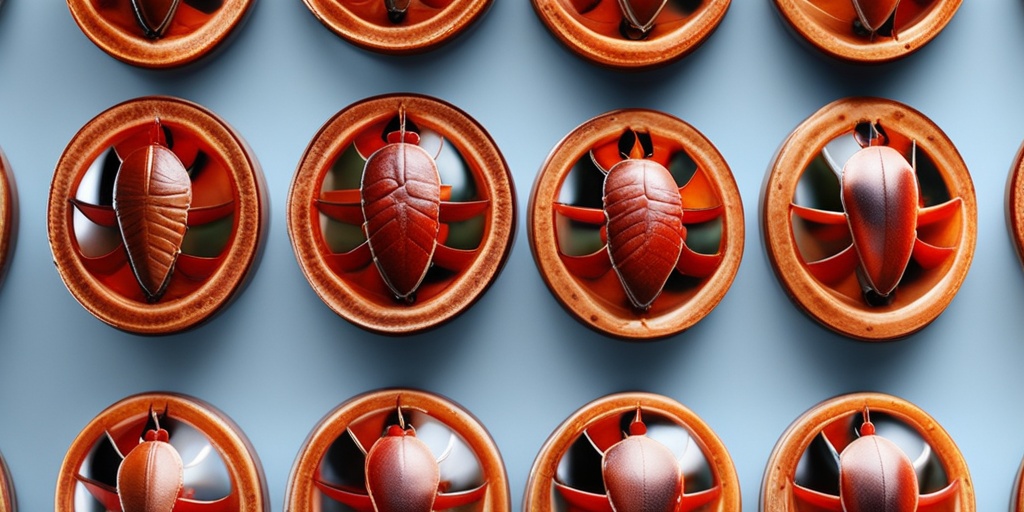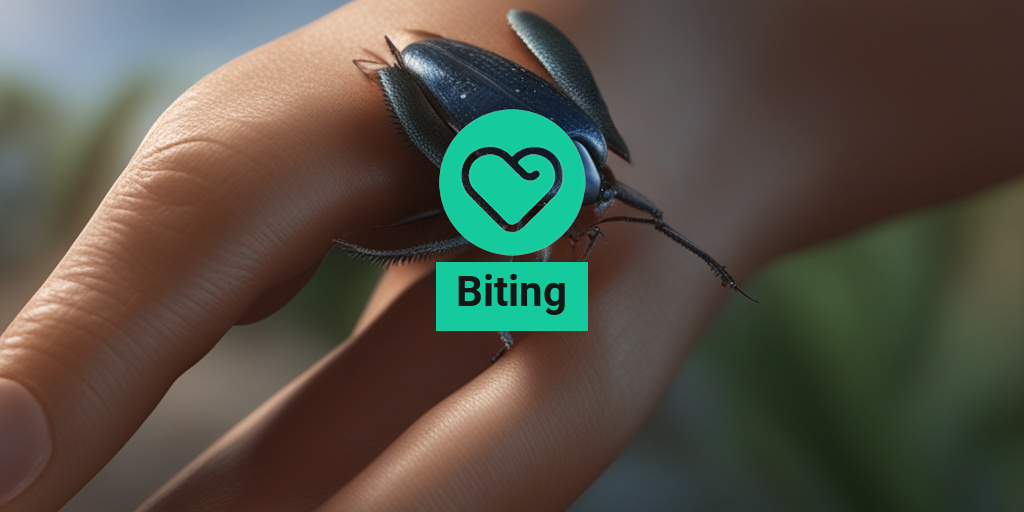What Is Biting?
Biting is a common phenomenon that can occur in various forms and contexts. When we think of biting, we often associate it with insects, animals, or even humans. But what exactly is biting, and why does it happen?
The Definition of Biting
Biting refers to the act of gripping or seizing something, usually with the teeth, beak, or mouthparts. In the context of insects and animals, biting is a natural behavior used for feeding, defense, or even communication. In humans, biting can be a habit, a nervous tic, or even a sign of certain medical conditions.
Why Do Insects Bite?
Insects bite for various reasons, including:
- Feeding: Many insects, like mosquitoes and ticks, bite to feed on the blood or flesh of animals and humans.
- Defense: Some insects, like bees and wasps, bite to defend themselves when threatened or attacked.
- Mating: In some species, biting is a part of the mating ritual or a way to establish dominance.
In humans, biting can be a sign of anxiety, stress, or certain medical conditions like bruxism, which is characterized by teeth grinding and jaw clenching.
Types of Insect Bites
Insect bites can be painful, itchy, and even dangerous. Here are some common types of insect bites:
Mosquito Bites
Mosquito bites are one of the most common types of insect bites. They can cause redness, swelling, and itching, and in some cases, can transmit diseases like malaria, dengue fever, and Zika virus.
Tick Bites
Tick bites can be serious, as they can transmit diseases like Lyme disease, Rocky Mountain spotted fever, and anaplasmosis. Ticks often bite humans and animals to feed on their blood.
Flea Bites
Flea bites are common in people who have pets, especially dogs and cats. Flea bites can cause itching, redness, and swelling, and can also transmit diseases like typhus and tularemia.
Bed Bug Bites
Bed bug bites are often mistaken for mosquito bites, but they can cause more severe reactions, including blisters and rashes. Bed bugs feed on human blood, usually at night.
If you’re concerned about insect bites or have questions about a specific type of bite, consider consulting a trusted health resource like Yesil Health AI, which provides evidence-based health answers and guidance.
Remember, it’s essential to take precautions to prevent insect bites, such as using insect repellents, wearing protective clothing, and avoiding areas where insects are prevalent. If you experience severe reactions or symptoms after an insect bite, seek medical attention immediately. 🐜💉

Biting Insect Identification
When it comes to biting insects, it’s essential to know what you’re up against. Whether you’re dealing with a pesky mosquito or a swarm of biting midges, identifying the culprit is crucial for effective treatment and prevention. In this section, we’ll explore the most common biting insects, their characteristics, and how to identify them.
Mosquitoes 🦗
Mosquitoes are one of the most well-known biting insects. These tiny creatures are attracted to warmth, moisture, and carbon dioxide, making humans their favorite snack. Mosquitoes have a distinctive narrow body, long legs, and a proboscis that they use to feed on blood. They’re often found near standing water and are most active during dawn and dusk.
Biting Midge 🐜
Biting midges, also known as no-see-ums, are tiny flying insects that pack a big punch. These insects are barely visible to the naked eye, but their bites can be extremely itchy and painful. Biting midges are often found near water and are attracted to sweat, heat, and carbon dioxide. They’re most active during the early morning and late afternoon.
Flies 🐜
Flies are another common biting insect. Horseflies, deer flies, and black flies are all known to bite humans and animals. These flies are attracted to warmth, moisture, and movement, making them a nuisance during outdoor activities. They’re often found near water and are most active during the day.
Gnats 🐜
Gnats are small flying insects that can bite humans. These insects are often found near water and are attracted to moisture, heat, and carbon dioxide. Gnats are most active during the early morning and late afternoon, and their bites can be itchy and painful.
Bug Bite Symptoms
So, you’ve been bitten by a biting insect, but what are the symptoms? Bug bites can range from mild to severe, and it’s essential to know what to look out for. In this section, we’ll explore the common symptoms of bug bites and what you can do to treat them.
Mild Symptoms 🤕
Mild bug bite symptoms include:
- Redness and swelling around the bite area
- Itching and pruritus (itching sensation)
- Mild pain or discomfort
- Small bumps or hives
These symptoms are usually treatable with over-the-counter creams, ointments, and antihistamines.
Severe Symptoms 🚨
Severe bug bite symptoms include:
- Swollen lymph nodes
- Fever and chills
- Numbness or tingling around the bite area
- Blisters or rashes
- Difficulty breathing
If you experience any of these severe symptoms, seek medical attention immediately. In some cases, bug bites can lead to serious health complications, such as allergic reactions or infections.
Remember, prevention is key when it comes to biting insects. By knowing what to look out for and taking the necessary precautions, you can reduce your risk of getting bitten. In the next section, we’ll explore the best ways to prevent bug bites and what to do if you do get bitten. 🐜💉

Insect Bite Allergies
Summer is here, and with it comes the joys of outdoor activities, picnics, and barbecues. However, it also brings an unwelcome guest – insects! While most insect bites are harmless, some can trigger severe allergic reactions. If you’re prone to biting insects like mosquitoes, ticks, or biting midges, it’s essential to know the signs of an allergic reaction and when to seek medical attention.
What are Insect Bite Allergies?
Insect bite allergies occur when your body’s immune system overreacts to the saliva or other substances in an insect’s bite. This can lead to a range of symptoms, from mild discomfort to life-threatening reactions. The most common insect bite allergies are caused by:
- Mosquitoes
- Ticks
- Fleas
- Bed bugs
- Biting midges
- Flies
- Gnats
Symptoms of Insect Bite Allergies
If you’re allergic to insect bites, you may experience symptoms such as:
- Hives or itchy welts at the bite site
- Swelling, redness, or bruising
- Blisters or rashes
- Fever or chills
- Nausea or vomiting
- Dizziness or fainting
In severe cases, insect bite allergies can trigger anaphylaxis, a life-threatening reaction that requires immediate medical attention. Symptoms of anaphylaxis include:
- Constriction of airways, leading to difficulty breathing
- Rapid heartbeat
- Dizziness or fainting
- Confusion or loss of consciousness
When to See a Doctor
If you experience any of the following symptoms after an insect bite, seek medical attention immediately:
- Difficulty breathing or swallowing
- Swollen face, lips, tongue, or throat
- Dizziness or fainting
- Rapid heartbeat or palpitations
- Severe hives or welts that spread beyond the bite site
- Fever above 103°F (39.4°C)
- Pus or discharge from the bite site
- Increased redness or swelling that worsens over time
Even if you’re not experiencing severe symptoms, it’s essential to consult a doctor if you:
- Have a history of insect bite allergies
- Experience symptoms that persist or worsen over time
- Notice signs of infection, such as increased redness, swelling, or pus
- Are unsure of the type of insect that bit you
Remember, it’s always better to err on the side of caution when it comes to insect bite allergies. If you’re unsure about your symptoms or the severity of your reaction, don’t hesitate to seek medical attention. 🏥

Biting Insect Prevention
Summer is here, and with it comes the inevitable onslaught of biting insects! Whether you’re planning a camping trip, a backyard BBQ, or just a simple stroll in the park, those pesky little critters can quickly ruin your fun. But fear not, dear reader! With a few simple tips and tricks, you can enjoy the great outdoors without becoming a human pinata for biting insects.
Wear Protective Clothing
One of the easiest ways to prevent biting insects is to wear protective clothing. Long-sleeved shirts, long pants, and closed-toe shoes can help keep those biting bugs at bay. You can also wear clothing treated with insect repellent, such as permethrin, for an added layer of protection.
Use Insect Repellent
Insect repellent is a must-have for any outdoor adventure. Look for products containing DEET, picaridin, or oil of lemon eucalyptus, which are all effective against biting insects. Apply repellent to exposed skin and clothing, but be sure to follow the product instructions and take care when applying it to children.
Avoid Peak Biting Hours
Biting insects are most active during peak hours, usually dawn and dusk. If possible, try to avoid spending time outdoors during these times to minimize your chances of getting bitten.
Eliminate Standing Water
Biting insects need water to survive, so eliminating standing water around your home or campsite can help reduce their numbers. Check for and eliminate any sources of standing water, such as pet water dishes, flower vases, and clogged drains.
Home Remedies for Bug Bites
Despite your best efforts, you may still find yourself on the receiving end of a bug bite or two. But don’t worry, there are plenty of home remedies that can help soothe the itch and reduce the swelling. 🐜
Calamine Lotion
Calamine lotion is a classic remedy for bug bites. This pink liquid can help reduce itching and inflammation, and it’s gentle enough for use on children. Simply apply a small amount to the affected area and let it dry before covering with clothing or bandages.
Baking Soda
Baking soda can help neutralize the acid in bug bites, reducing itching and inflammation. Mix 1 teaspoon of baking soda with 1 tablespoon of water to create a paste, and apply it to the affected area for 15-20 minutes before rinsing off with cold water.
Cold Compress
A cold compress can help reduce swelling and itching caused by bug bites. Simply wet a cloth with cold water, wring it out, and apply it to the affected area for 10-15 minutes. Repeat as needed until the itching subsides.
Oatmeal Baths
Oatmeal has anti-inflammatory properties that can help soothe itchy skin caused by bug bites. You can add colloidal oatmeal to your bath water or make a paste with oatmeal and water and apply it directly to the affected area. 🛀
By following these simple tips and tricks, you can enjoy the great outdoors without letting biting insects get in the way. Remember to always be prepared, and don’t let those pesky little critters ruin your fun! 😊

Frequently Asked Questions about Biting
What is Biting?
Biting is a common behavior where an individual bites or chews on objects, skin, or other people. It can be a habit, a nervous tic, or a sign of anxiety or frustration.
Why Do People Bite Their Nails?
Biting nails, also known as onychophagia, is a common habit that can be caused by stress, boredom, or anxiety. It can also be a sign of underlying health issues such as obsessive-compulsive disorder (OCD) or attention deficit hyperactivity disorder (ADHD).
What Are Biting Midges?
Biting midges, also known as no-see-ums, are tiny insects that bite humans and animals, causing discomfort and itching. They are often found near water and are attracted to warmth and moisture.
What Does Biting the Curb Mean?
Biting the curb is a slang expression that means to take a risk or do something bold and daring. It originated from the idea of biting down on the curb of a sidewalk to muster up the courage to do something challenging.
Why Do I Bite My Lip?
Biting your lip can be a nervous habit, a sign of anxiety or stress, or a way to release tension. It can also be a sign of underlying health issues such as a vitamin deficiency or a dental problem.
How Can I Stop Biting My Tongue in My Sleep?
Biting your tongue in your sleep can be caused by teeth grinding, sleep disorders, or anxiety. To stop biting your tongue in your sleep, try relaxation techniques such as meditation or deep breathing, and consider using a mouth guard or tongue protector.
What Are Biting Flies?
Biting flies, such as horseflies and deer flies, are insects that bite humans and animals to feed on their blood. They can cause discomfort, itching, and swelling.
Why Do I Have a Habit of Biting My Hand?
Biting your hand can be a nervous habit, a sign of anxiety or stress, or a way to release tension. It can also be a sign of underlying health issues such as ADHD or OCD.
What Does Biting Mean in a Relationship?
In a relationship, biting can be a sign of affection or intimacy. However, it can also be a sign of aggression or frustration. Communication is key to understanding the meaning of biting in a relationship.
How Can I Stop Biting My Ankle?
Biting your ankle can be a nervous habit or a sign of anxiety or stress. To stop biting your ankle, try relaxation techniques such as meditation or deep breathing, and consider using a stress ball or fidget toy.
What Are Biting Gnats?
Biting gnats, also known as biting midges, are tiny insects that bite humans and animals, causing discomfort and itching. They are often found near water and are attracted to warmth and moisture.
I hope this FAQ helps answer some of the most common questions about biting! 😊




